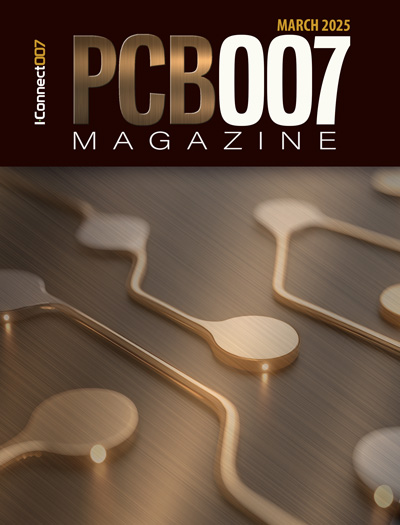-

- News
- Books
Featured Books
- pcb007 Magazine
Latest Issues
Current Issue
The Essential Guide to Surface Finishes
We go back to basics this month with a recount of a little history, and look forward to addressing the many challenges that high density, high frequency, adhesion, SI, and corrosion concerns for harsh environments bring to the fore. We compare and contrast surface finishes by type and application, take a hard look at the many iterations of gold plating, and address palladium as a surface finish.

It's Show Time!
In this month’s issue of PCB007 Magazine we reimagine the possibilities featuring stories all about IPC APEX EXPO 2025—covering what to look forward to, and what you don’t want to miss.

Fueling the Workforce Pipeline
We take a hard look at fueling the workforce pipeline, specifically at the early introduction of manufacturing concepts and business to young people in this issue of PCB007 Magazine.
- Articles
- Columns
Search Console
- Links
- Media kit
||| MENU - pcb007 Magazine
What Electronics Manufacturers Need to Know About RoHS 3 Compliance
December 27, 2018 | David Weekes, JJS ManufacturingEstimated reading time: 3 minutes
On July 22, 2019, the latest incarnation of RoHS (the Restriction of Hazardous Substances) will come into full effect across the European Union.
So, what’s changed? And what exactly are the implications for UK electronics manufacturers?
In this article, we provide a recap of what RoHS is, why it matters, and the steps that OEMs will need to take to ensure compliance.
What is RoHS?
RoHS originated in the European Union in 2002 with the aim of restricting the use of specific hazardous substances found in the manufacture of electrical and electronic equipment (EEE) that have been identified as presenting a risk to human health and the environment.
The original directive 2002/95/EC known as RoHS laid down restrictions in relation to six key hazardous substances:
- Lead (Pb): found in printed circuit board (PCB) finishes, paints and pigments
- Mercury (Hg): used in lighting applications and automotive switches
- Cadmium (Cd): used in plastic pigmentation and photocells
- Hexavalent Chromium (CR VI): used to prevent corrosion of metal finishes
- Polybrominated biphenyls (PBBs): primarily used as flame retardants
- Polybrominated Diphenyl Ethers (PBDEs): primarily used as flame retardants
How has RoHS changed?
In 2011 came the publication of the directive 2011/65/EU, known as RoHS 2 or RoHS Recast, which took formal effect in July 2013. A significant addition to RoHS 2 was the inclusion of the CE-marking directive—the requirement for a certification mark that indicates that a product conforms with all health and safety and environmental protection standards within the European Economic Area.
The newest update of the directive 2015/863, known as RoHS 3, adds another four substances to the original list of six. All the new additions are forms of phthalates—the family of chemical compounds used to add flexibility, durability and transparency to plastics:
- Bis(2-ethylhexyl) phthalate (DEHP): a plastic polymer (plasticizer) previously used in cable and wire insulation, as a dielectric in large high-voltage capacitors, as a processing aid for rigid polymers and as a softener in a wide array of PVC medical devices.
- Butyl benzyl phthalate (BBP): occasionally used as a co-plasticizer in wire and cable; as an additive in flexible adhesives, coatings and inks; and in polyurethane adhesives, polyurethane rubbers and acrylic-based polymers.
- Dibutyl phthalate (DBP): used as a plasticizer in flexible varnishes, nitrocellulose paints and paper coatings; to "size" glass fiber and to add flexibility to rubbers and paints.
- Diisobutyl phthalate (DIBP): a plasticizer known to hold very similar properties to DPB but generally not known to be used in electronic products.
Who needs to comply?
If you're an electronics manufacturer who sells applicable electronic products or sub-assemblies to EU or countries—or if you're supplying to resellers or distributors who sell products on to RoHS countries—then RoHS 3 compliance applies to you.
For UK OEMs, this means ensuring that none of your products exceed the maximum prescribed levels of any of the 10 restricted substances on the RoHS list. You will also be required to keep records to demonstrate this compliance and to hold onto these records for a minimum of 10 years.
Required compliance record-keeping can also include providing evidence of CE marking, proof of compliance throughout the production process and along the entire supply chain, records of conformity assessments and the self-reporting of any instances of non-compliance.
In the event that a product is found (or is suspected) to be non-compliant, all parties will need to take steps to inform UK Safety and Standards, to notify the supply chain and to take appropriate remedial action, whether by fixing, quarantining, recalling or withdrawing the item.
Further guidance
For a deeper understanding of RoHS, including additional guidance for manufacturers, importers and distributors, the National Measurement & Regulation Office have produced a 39-page report which can be downloaded here.
This article originally appeared on the JJS Manufacturing blog, which can be found here.
Suggested Items
Nortech Systems Reports Q4 Results
03/31/2025 | Nortech SystemsNortech Systems Incorporated, a leading provider of engineering and manufacturing solutions for complex electromedical and electromechanical products serving the medical, industrial and defense markets, reported financial results for the fourth quarter ended December 31, 2024.
Investment in High-Tech Manufacturing: Zollner Opens Cleanroom in Hungary
03/28/2025 | Zollner Elektronik AGIn a ceremonial event on March 13, 2025, representatives from ASML and Zollner inaugurated the new cleanroom at the Hungarian site in Vác. Among those present were Wayne Allan, Chief Strategic Sourcing & Procurement Officer, and Member of the Board of Management at ASML, Michiel Claessens.
MVTec, Pepperl+Fuchs Enter into Technology Partnership
03/27/2025 | MVTecMVTec Software GmbH and Pepperl+Fuchs are stepping up their technological collaboration in the field of machine vision. As part of this, Pepperl+Fuchs joined the MVTec Technology Partner program at the beginning of 2025.
LN Phase Modulator, ASE Light Source Module for Fiber Optic Gyroscope
03/26/2025 | POINTekPOINTek, Inc., a global leader and provider of high performance athermal AWG products, announced launching of a new family of aerospace application products: Lithium Niobate Phase Modulator and ASE Light Source Module for Fiber Optic Gyroscope (FOG).
Flex Opens New Product Introduction (NPI) Center Serving Healthcare Customers in North America
03/25/2025 | FlexFlex announced the opening of its new product introduction (NPI) center near Boston, Mass., serving healthcare customers.


